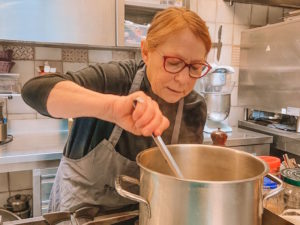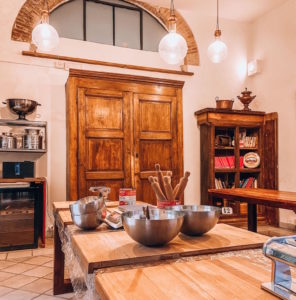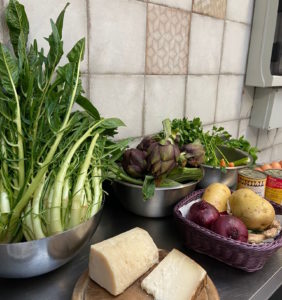‘Winning Women:’ Chef Benedetta Vitali

Benedetta Vitali’s accomplishments are not only in the kitchen; her status as a pioneer applies to all walks of life. Most known for co-founding one of Florence’s most successful restaurants, Cibrèo, she has had a long and fascinating culinary career, which continues today.
Originally a student of architecture, Vitali never intended to pursue cooking. When, however, an old trattoria closed in the unfashionable Sant’Ambrogio neighborhood, she and her then-husband heard about the offer and decided to give the restaurant business a shot. He was passionate about food but at the time she was not as invested in it; only through opening Cibrèo did she discover a love for the culinary arts.
In 1979, at age 23, she and her former husband inaugurated the Cibrèo restaurant. At this time, the restaurant scene looked vastly different than it does now. Florentine trattorie served cheap food utilizing basic recipes, ambiances were very casual and there was little attention paid to the care of customers. On the high end, there were restaurants offering menus catered to international guests.
Cibrèo served as the complete antithesis, with Vitali and her then-husband committed to creating meals that were of high quality with the freshest ingredients. Their concept of a restaurant as a traditional Florentine experience from recipes to décor, was unique. They also emphasized hospitality, completely revolutionizing the local restaurant industry. Thanks to the success of Cibrèo and its subsequent spinoffs, Florence is now characterized by the bustling food and wine scene that everyone knows it for today.
Cibrèo was immediately successful, so in 1991, they opened a café as well. The couple initially worked together in the kitchen. Following the birth of their four children, in the morning she would mainly make the desserts for both the restaurant and the café, which allowed time to devote to the family after lunch.
After the marriage broke up and she left Cibrèo, Vitali started her own restaurant in 1999, called Zibibbo, emphasizing modern décor in a less-urban location outside the city center. At this restaurant, she branched out from her beginnings by making fresh pasta, which Cibrèo, did not serve and was not a norm in Florentine cuisine, along with dishes from regions throughout Italy. She also employed a female sommelier to ensure their wine selection was impressive. At the time it was also rare to hire a woman for this position.
Zibbibo was open till 2011-2012, when she decided to close it. Vitali took a sabbatical for a couple of years, then began to pursue other projects.
She began teaching cooking classes—in English or Italian—at Badia a Coltibuono, a notable wine-producing estate near Gaiole in Chianti, in 2015. In the cooking classes, Vitali uses produce that was grown in the Badia garden to cook with and taught how to make traditional Tuscan recipes, such as making bread, pasta, crustless quiches, roast pork and desserts.
She also wrote a book in English called “Sofritto: Tradition and Innovation in Tuscan Cooking,” named after a traditional Tuscan base for soups and sauces. It offers a look into the recipes and history of local dishes.
When Vitali started her cooking career, there were no women in the kitchen; only men were chefs. She did not, however, let this deter her. During her time at Zibbibo, she founded an association of women chefs called the Kokoro project, which is a Japanese word meaning “heart, mind, soul.” The purpose of this group was to encourage young professionals to get involved in the food industry. Even though the association is not active now, she hopes to revive this soon.

Vitali also teaches cooking classes in the Florence’s Santo Spirito neighorhood at the Florence Food Studio, both in English and Italian. She is also planning to release a new book next year, “Cucina,” which focuses on the increasingly popular concept of farm to table, highlighting home cooking throughout Italian regions. English and Italian editions are in the works.
Just as title of book suggests, Vitali has not only kept tradition alive through her cooking; she has also made notable innovations as a successful female chef. She is universally known for highlighting the best and the best use of each ingredient, allowing the essence of a recipe to shine as the delectable result on her table. (marissa conter)

